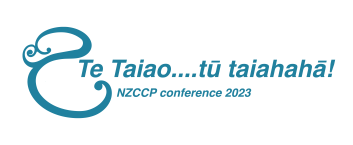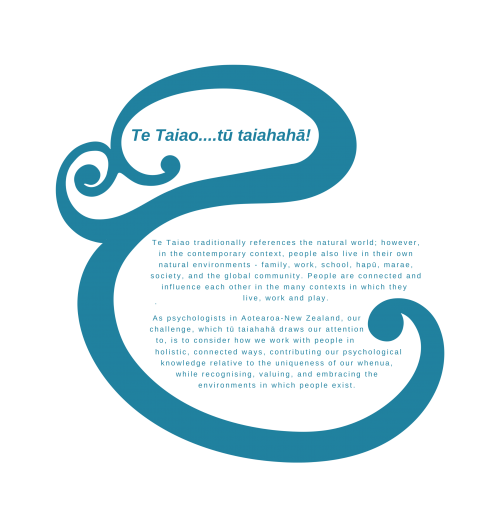NZCCP NATIONAL CONFERENCE
Saturday 25 & Sunday 26 March, 2023
James Cook Hotel Grand Chancellor, Wellington
Download the conference book for more information
and
Download the conference programme here
PRE- and POST-CONFERENCE WORKSHOPS
Thursday 23 March, 9am-4.30pm: He Puna Whakaata: - Presented by a Mātauranga Māori specialist & a clinical psychologist
Friday 24 March, 9am-12.30pm: Julia Rucklidge - Nutritional Therapies for Psychological Symptoms: How to implement nutrition into your practice.
Friday 24 March, 1-5pm: Dr. Diana KOPUA & Tohunga Mark KOPUA - Te Kurahuna: Mahi a Atua
Monday 27 March: Cognitive Assessment for Non-Neuropsychologists, with Dr Paul Skirrow & Dr Nic Ward
NB: Please let us know if you are experiencing increased adversity due to recent weather events and want to reconsider your in-person attendance at conference: office@nzccp.co.nz
CONFERENCE KEYNOTE PRESENTERS
Dr. Diana KOPUA & Tohunga Mark KOPUA - Te Kurahuna: Mahi a Atua Te Kurahuna: Mahi a  Atua is the deployment of Mātauranga Māori, Pūrākau, Maramataka, Feedback Informed Treatment and associated techniques and knowledge that support this paradigm shift. As the founder and Manukura of Te Kurahuna: Mahi a Atua, Psychiatrist Dr. Diana Kopua will share Te Kurahuna’s vision, strategy and outcomes as they expand to create social impact. The point of difference for Te Kurahuna is ‘pūrākau.’ This trademark is woven into Te Kurahuna- Mahi a Atua strategy creating new opportunities with iwi Māori and communities to reconceptualise distress, confidently design and implement frameworks and strategies that affirm Māori whakapapa and achieve whānau ora.
Atua is the deployment of Mātauranga Māori, Pūrākau, Maramataka, Feedback Informed Treatment and associated techniques and knowledge that support this paradigm shift. As the founder and Manukura of Te Kurahuna: Mahi a Atua, Psychiatrist Dr. Diana Kopua will share Te Kurahuna’s vision, strategy and outcomes as they expand to create social impact. The point of difference for Te Kurahuna is ‘pūrākau.’ This trademark is woven into Te Kurahuna- Mahi a Atua strategy creating new opportunities with iwi Māori and communities to reconceptualise distress, confidently design and implement frameworks and strategies that affirm Māori whakapapa and achieve whānau ora.
 Te Kurahuna Co-Manukura Tohunga Mark Kopua will discuss the significant change that occurred in both Te Tairāwhiti and Hauraki through the implementation of Mahi-a-Atua. The solution was big and it needed to be with a deliberate purpose to revolutionise the system. It took courage, space and time. Time to delve deeper, look harder and support communities to bring together both clinical and cultural expertise. While many stayed working with certitude, in ways that were familiar about what change would mean to them, a group of Mataora (change agents) forged ahead.
Te Kurahuna Co-Manukura Tohunga Mark Kopua will discuss the significant change that occurred in both Te Tairāwhiti and Hauraki through the implementation of Mahi-a-Atua. The solution was big and it needed to be with a deliberate purpose to revolutionise the system. It took courage, space and time. Time to delve deeper, look harder and support communities to bring together both clinical and cultural expertise. While many stayed working with certitude, in ways that were familiar about what change would mean to them, a group of Mataora (change agents) forged ahead. Monique Faleafa Monique is a Partner in PwC’s Consulting practice and co-leads the Hauora industry group. Of Samoan descent, and a practicing Clinical Psychologist, she is passionate about supporting people and organisations to unleash their full potential. She enjoys the challenge of tackling complex wellbeing and business problems. Monique brings over 20 years’ experience in wellbeing, clinical, community, policy, equity, workforce, regulatory and governance roles across primary and secondary healthcare as well as wider social sectors. Monique has a unique skillset as a Clinical Psychologist with a focus on mental health and wellbeing as well and equity, change and business. As a valued health & wellbeingleader, Monique works alongside private and public agencies, DHBs, NGOs, primary care services, Māori and Pacific providers, crown entities and government agencies supporting transformational systems change, and impactful service design and delivery. Monique is a Member of the NZ Order of Merit and internationally she was a mental health advisor to Australia’s National Rugby League for 8 years, is an Alumni of the commonwealth Emerging Pacific Leaders Dialogue, and an Associate Member of Global Women. She has been a finalist in the Westpac Women of Influence awards and featured in leadership books such as Leaders Like You, and Womankind.
Monique Faleafa Monique is a Partner in PwC’s Consulting practice and co-leads the Hauora industry group. Of Samoan descent, and a practicing Clinical Psychologist, she is passionate about supporting people and organisations to unleash their full potential. She enjoys the challenge of tackling complex wellbeing and business problems. Monique brings over 20 years’ experience in wellbeing, clinical, community, policy, equity, workforce, regulatory and governance roles across primary and secondary healthcare as well as wider social sectors. Monique has a unique skillset as a Clinical Psychologist with a focus on mental health and wellbeing as well and equity, change and business. As a valued health & wellbeingleader, Monique works alongside private and public agencies, DHBs, NGOs, primary care services, Māori and Pacific providers, crown entities and government agencies supporting transformational systems change, and impactful service design and delivery. Monique is a Member of the NZ Order of Merit and internationally she was a mental health advisor to Australia’s National Rugby League for 8 years, is an Alumni of the commonwealth Emerging Pacific Leaders Dialogue, and an Associate Member of Global Women. She has been a finalist in the Westpac Women of Influence awards and featured in leadership books such as Leaders Like You, and Womankind.
 Taciano Milfont: Psychology in the Anthropocene Epoch Human activity is having a significant impact on Earth’s climate and ecosystems, and climate change is arguably the greatest environmental threat humanity has ever faced. The human impact is so profound that scientists are proposing the Anthropocene as a potential new epoch of geological time. What are the implications for psychologists? On one hand, psychologists can contribute to understanding the climate crisis, and help with mitigation and adaption efforts. On the other hand, anecdotal and emerging empirical evidence suggests growing worry and anxiety related to the consequences of climate change, particularly so for younger people. Psychologists can also contribute to understanding and addressing the impact of the climate crisis on mental health and emotional wellbeing. In my talk, I will discuss these topics building on from the report of the APA Task Force on Climate Change that I co-authored.
Taciano Milfont: Psychology in the Anthropocene Epoch Human activity is having a significant impact on Earth’s climate and ecosystems, and climate change is arguably the greatest environmental threat humanity has ever faced. The human impact is so profound that scientists are proposing the Anthropocene as a potential new epoch of geological time. What are the implications for psychologists? On one hand, psychologists can contribute to understanding the climate crisis, and help with mitigation and adaption efforts. On the other hand, anecdotal and emerging empirical evidence suggests growing worry and anxiety related to the consequences of climate change, particularly so for younger people. Psychologists can also contribute to understanding and addressing the impact of the climate crisis on mental health and emotional wellbeing. In my talk, I will discuss these topics building on from the report of the APA Task Force on Climate Change that I co-authored.
Dr Taciano L. Milfont is Professor of Environmental Psychology at Te Kura Whatu Oho Mauri – School of Psychology, University of Waikato. He is known for applying insights from social and behavioural sciences to address environmental problems, and has received several awards including the 2013 GV Goddard Early Career Award from the New Zealand Psychological Society. Widely published in high-ranked journals (e.g., Nature Climate Change, Global Environmental Change, Journal of Personality and Social Psychology, Journal of Environmental Psychology), he is ranked 3rd on Google Scholar out of all international researchers who have listed ‘applied social psychology’ as one of their areas of research expertise.
 Julia Rucklidge: Nutrition Provides an Essential Foundation for Optimizing Mental Health: A New Frontier for Psychologists Despite the advent of new medications and other psychotherapies over the last century, rates of mental illness have been on the rise. We have more psychologists, more prescriptions and more money being poured into the public health care system but the rates keep intensifying. We continue to do more of the same expecting a different outcome. What if we are looking for solutions in the wrong places? What if in addition to psychotherapy, psychologists also ensured their clients are adequately feeding their brains? Over the last two decades, scientists have uncovered an uncomfortable truth: what we eat is fundamentally affecting our mental health. In this keynote presentation, Professor Rucklidge will identify the food choices and dietary patterns that serve as risk factors to psychiatric problems. She will discuss the recent paradigm shift of using nutrition to avoid, treat or lessen mental illness. She will discuss the challenges for implementation, food insecurity, wider public reforms that need to occur and the ethics of talking about nutrition as a psychologist. The talk intends to challenge our current treatment regime for mental disorders and suggest an additional powerful course of action. Finally, the talk will offer practical suggestions for psychologists to incorporate this information into their clinical practice and discuss these suggestions within the context of informed consent.
Julia Rucklidge: Nutrition Provides an Essential Foundation for Optimizing Mental Health: A New Frontier for Psychologists Despite the advent of new medications and other psychotherapies over the last century, rates of mental illness have been on the rise. We have more psychologists, more prescriptions and more money being poured into the public health care system but the rates keep intensifying. We continue to do more of the same expecting a different outcome. What if we are looking for solutions in the wrong places? What if in addition to psychotherapy, psychologists also ensured their clients are adequately feeding their brains? Over the last two decades, scientists have uncovered an uncomfortable truth: what we eat is fundamentally affecting our mental health. In this keynote presentation, Professor Rucklidge will identify the food choices and dietary patterns that serve as risk factors to psychiatric problems. She will discuss the recent paradigm shift of using nutrition to avoid, treat or lessen mental illness. She will discuss the challenges for implementation, food insecurity, wider public reforms that need to occur and the ethics of talking about nutrition as a psychologist. The talk intends to challenge our current treatment regime for mental disorders and suggest an additional powerful course of action. Finally, the talk will offer practical suggestions for psychologists to incorporate this information into their clinical practice and discuss these suggestions within the context of informed consent.
Julia is a Professor of Clinical Psychology in the School of Psychology, Speech and Hearing at the University of Canterbury and the Director of Te Puna Toiora, the Mental Health and Nutrition Research Lab and co-author of The Better Brain. Originally from Toronto, Canada, she completed her PhD at the University of Calgary in clinical psychology, and in 2000, she immigrated to New Zealand. She has become well known for her research investigating the interface between nutrition and mental health, having published over 150 empirical papers, frequently featuring in the media on her work and being the recipient of numerous local and international awards, including the Ballin Award from the NZ Psychological Society for significant contributions to the development or enhancement of clinical psychology in Aotearoa New Zealand, being named as a Woman of Influence in New Zealand in 2015, 2018, and 2021, and a Braveheart award for her contribution to making Christchurch a better place to live. In 2020, she created a free EdX online course for the public on mental health and nutrition. She is also a longstanding member of the Health Practitioners Disciplinary Tribunal (HPDT). Her 2014 TEDx talk has been viewed close to 5 million times. Julia is passionate about translation of research to practice and making nutritional interventions for the brain mainstream.


